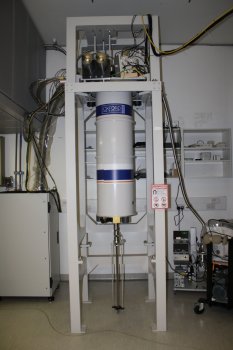An Oxford Instruments Triton Cryogen free dilution refrigerator has just found a new home at the London Centre for Nanotechnology (LCN) which is now the coldest point in central London.
This new state of the art Cryofree dilution refrigerator system has just been installed in the laboratory of Prof Sir Michael Pepper and will enable research at temperatures as low as 8.5 mK (or -273.142 centigrade) without the need for liquid helium. It also integrates with a Cryogen-free superconducting magnet providing a magnetic field up to 12 Tesla.
 Oxford Instruments Triton™ Cryogen free dilution refrigerator.
Oxford Instruments Triton™ Cryogen free dilution refrigerator.
The Triton will be used to study the behaviour of electrons in semiconductor nanostructures with particular importance for future quantum information systems. Examples of interesting research topics include the formation of Wigner Lattices in the transition between one and two dimensions, behaviour of electron spins in materials with high spin-orbit coupling, development of new techniques for the high frequency pumping of single electrons, with a precise measurement of the fundamental electron charge, and new concepts for formation and read-out of qubit information.
A number of major research institutions, companies and universities are now interested in this field, which has developed into an important part of nanotechnology.
Prof Sir Michael Pepper commented: "We are delighted with the performance of our new Triton Cryofree dilution refrigerator. It achieved 8.5 milliKelvin on the first run and we have already been able to collect meaningful experimental results after only two months of operation. The fact the system doesn't require any liquid helium and allows for quick sample change via a bottom loading probe means it is possible to concentrate on the experiments.
Because of the reliability of the system and the absence of any need to refill with helium, it is now possible to perform experiments remotely, at home or when travelling."